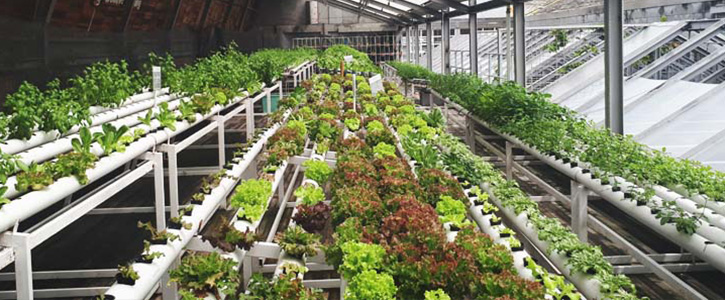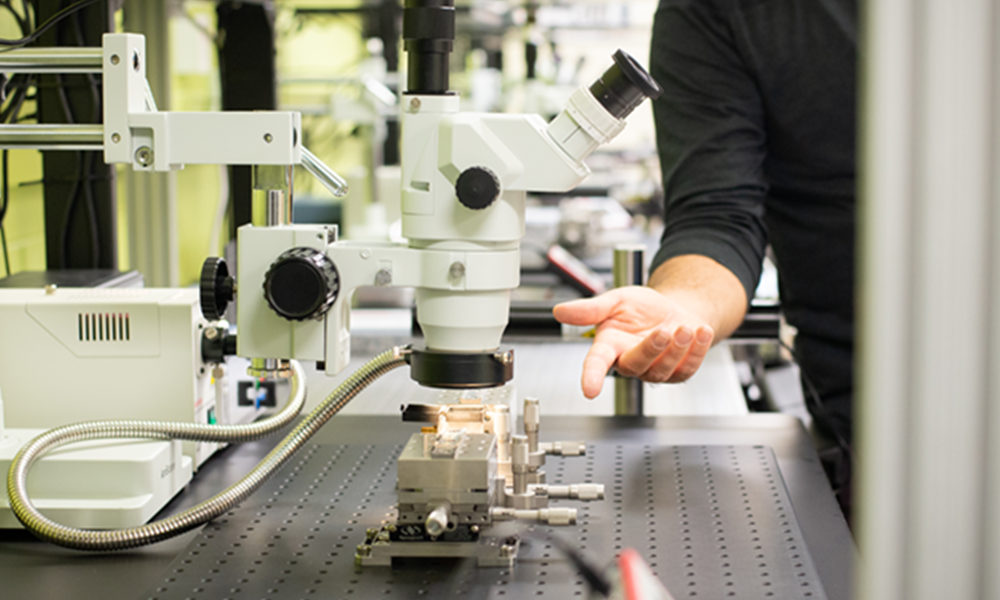In celebration of Earth Week and support of the Greenhouse Grown project, Western New England University, in partnership with Aramark and Wellspring Harvest greenhouse, hosted a pop-up food tasting on Thursday, April 22.
The event was hosted as part of the Henry P. Kendall Foundation grant WNE received in 2019 to promote locally grown produce. Through use of interactive displays on how hydroponic growing systems work, participant competitions, and participant surveys, the WNE community was able to see firsthand how vegetables and herbs are grown. The food sampling menu item, a specialty salad, was prepared by Chef Joel Weingert and his staff, using lettuce grown only three miles from campus at Wellspring Harvest greenhouse.
In collaboration with Wellspring Harvest, a hydroponic greenhouse in Springfield, the grant allows for enhanced opportunity to educate communities and distribute locally grown produce 12 months a year. As part of this partnership, WNE is currently receiving cases of lettuce each week from Wellspring Harvest, but in the future will be receiving cherry tomatoes, strawberries, herbs, and more. The intention of the program is to learn what students want to eat, and when possible, have Wellspring Harvest provide campus with hydroponically grown produce based on student interests and campus research of product demand.
Under the guidance of Jonathan Edwards, the Greenhouse Grown campus coordinator and member of the WNE Advancement staff, student ambassadors have significantly impacted the message and awareness of greenhouse grown produce on campus. Five current WNE students have been involved with the Greenhouse Grown project, both on campus and on site at the Wellspring Harvest greenhouse, including seniors Ally Neu and Mina Abraheem.
Neu, a marketing major from Rochester, NY, has been involved with the project since November 2020, joining the team after researching the project and the promotion for local produce in the WNE dining hall. Believing in the mission, she wanted to be involved.
"I have always known that local produce is less expensive, and obviously supporting local farmers. Since this experience, I learned in depth how locally sourced produce is healthier, chemical free, fresher, and leaving a better footprint on the earth. I will continue to actively look for local produce, although it is not always the easiest option," said Neu.
Abraheem, a marketing major from Natick, MA, got involved with the project through the Career Center while looking for an internship in marketing. This project was meaningful to her as growing up she always went to the Natick local farm market on Saturday mornings with her mother. She supports locally grown produce because it is not only a cause that means a lot to her, but also for the positive feelings that come from promoting healthier food alternatives for campus.
"I would encourage students to try to take their skills that they think they can bring to the table, and use it to enhance such a great project that isn't based off money but rather awareness and creating a healthier and stronger community," said Abraheem.
Neu and Abraheem recommend students to get involved with the project. "You get to be a part of a great mission while learning a lot about marketing, analytics, and locally sourced produce," Neu said.
In the fall of 2019, the University was awarded a $250,000 grant from the Henry P. Kendall Foundation. The grant has been implemented to promote locally grown produce to build and foster demand for locally grown produce through marketing and events like the campus-wide food tastings.
"Increasing understanding of and demand for locally grown produce in the middle of the winter helps in the battle to fight climate change, produces jobs in the urban core of Springfield, and provides healthier food options for the entire WNE community," said Edwards.
WNE joins Elms College and Springfield College as recipients of the grant. The three schools worked collaboratively sponsoring pop-up food tastings during Earth Week 2021 as well as educating each campus throughout the year. Through marketing and education across the partner campuses, as well as cost effective experimentation of new crops, this project strives to meet a continued and growing demand for regionally grown greenhouse produce at each institution. The food tasting events take place once per semester on each campus.





